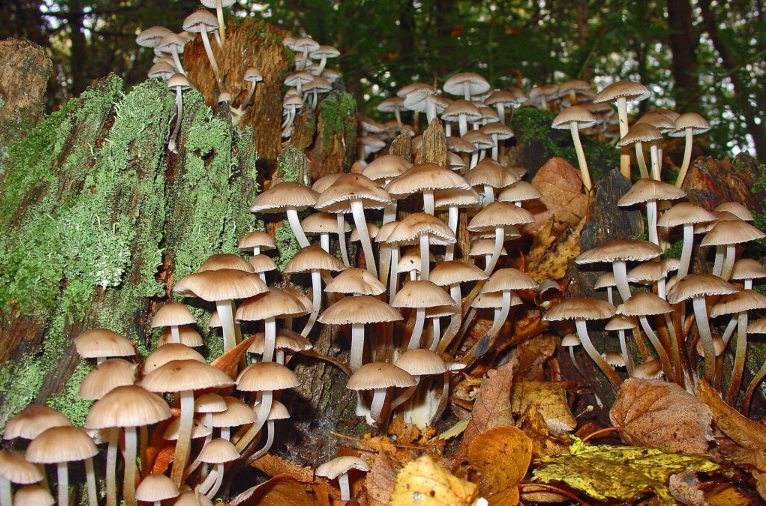Tom Prugh explores the overlapping qualities that Deliberative Democracy and the Gaian Way share, and their cross-fertilizing potentialities.
—
Not long ago Resilience.org featured an essay by Stan Cox of the Land Institute in which he warned of two “grim prospects”:
[O]ne, that continued abuse of the ecosphere could render much of the Earth unlivable for humans and myriad other species, and two, that the United States’ current political drift toward autocratic rule could accelerate, dashing any hope of attaining a multiracial, pluralistic democracy. These two emergencies are intertwined. Either we find meaningful responses to both, or we fail dramatically on both.
I think that’s right, and I agree that the two emergencies are linked, both in the United States and more broadly around the world. As David Orr has said, the problems of climate change (and the rest of the polycrisis elements) and the state of our democracy exist in an “intimate and reciprocal” relationship. To fix one, we need to fix the other as well—that is, Orr believes, we need to reinvent democracy. I agree with that point too, although I believe one key aspect of an effective reinvention is actually more like a resurrection or a recapture of some ancient practices of community self-governance that live on in deliberative democracy (more on that below).
Why might this be relevant to Gaians? Deliberative democracy (DD) shares some key features with Gaianism and is intrinsically compatible with it, to the point that Gaians might think about taking an interest in practicing and promoting DD.
First, Gaianism is about reverence and respect for the natural world, and its nurturance. At its core is the deep understanding of our embeddedness in, and utter dependence on, the ecosphere. Gaianism seeks to cultivate reconnection with and reverence for nature partly in order to reframe our relationship with it and reduce the damage we do.
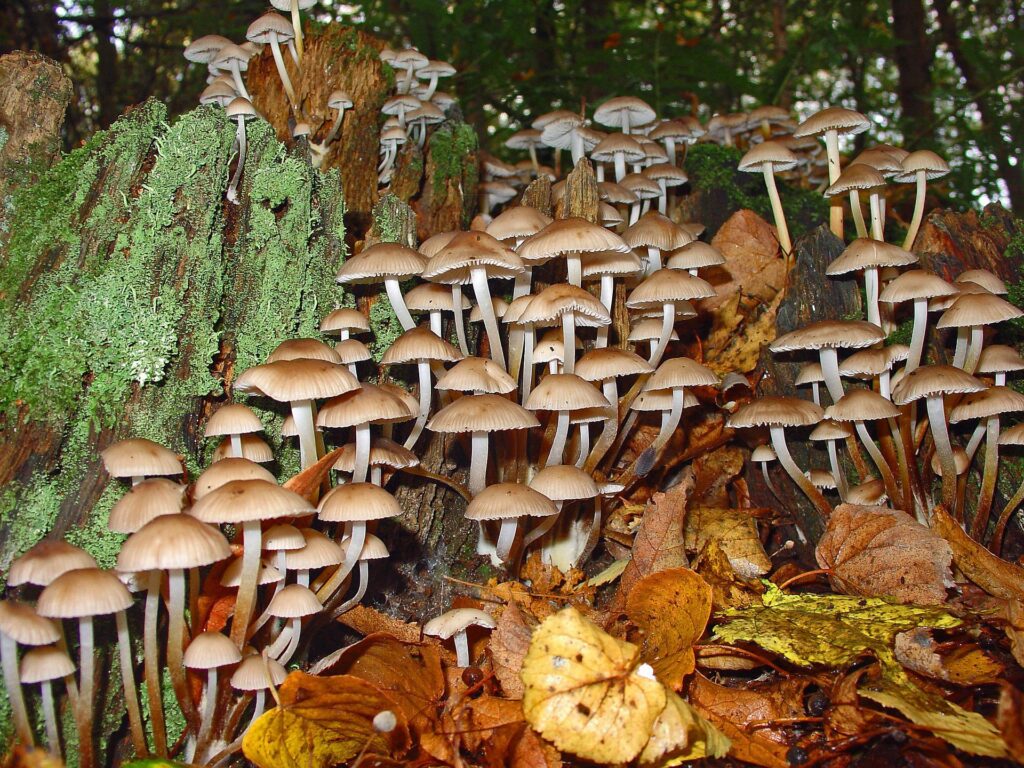
A deliberative discussion of industrious denizens of the woods. (Image from Phil59 via Pixabay)
Likewise, deliberative democracy, and its scholars and practitioners, hold that the ailments of modern democracy have to do with people’s alienation from the process and disaffection with its results. People very often feel unheard, unseen, disempowered, and generally not consulted—except occasionally via the blunt instrument of periodic elections. DD is a powerful way to reconnect people to the governance of their communities, regions, and nations. It’s a way to begin restoring “reverence and respect” for our politics, and thus a form of therapy for the body politic.
Second, both Gaianism and DD are “organic.” That is a much-abused word, but I think it’s allowable here; I mean it in the sense that they arise out of “natural” circumstances that are deeply rooted in our evolutionary history as social primates. The reverence and respect for Gaia obviously arose out of an appreciation of nature’s powers and the need to be intimately familiar with it in order to survive; modern Earth-systems science has only deepened that understanding. Deliberative democracy’s basic practices arose in the thousands of years in which humans lived primarily in groups small enough for most people to have an ongoing say in their governance, whether they were organized hierarchically or not.
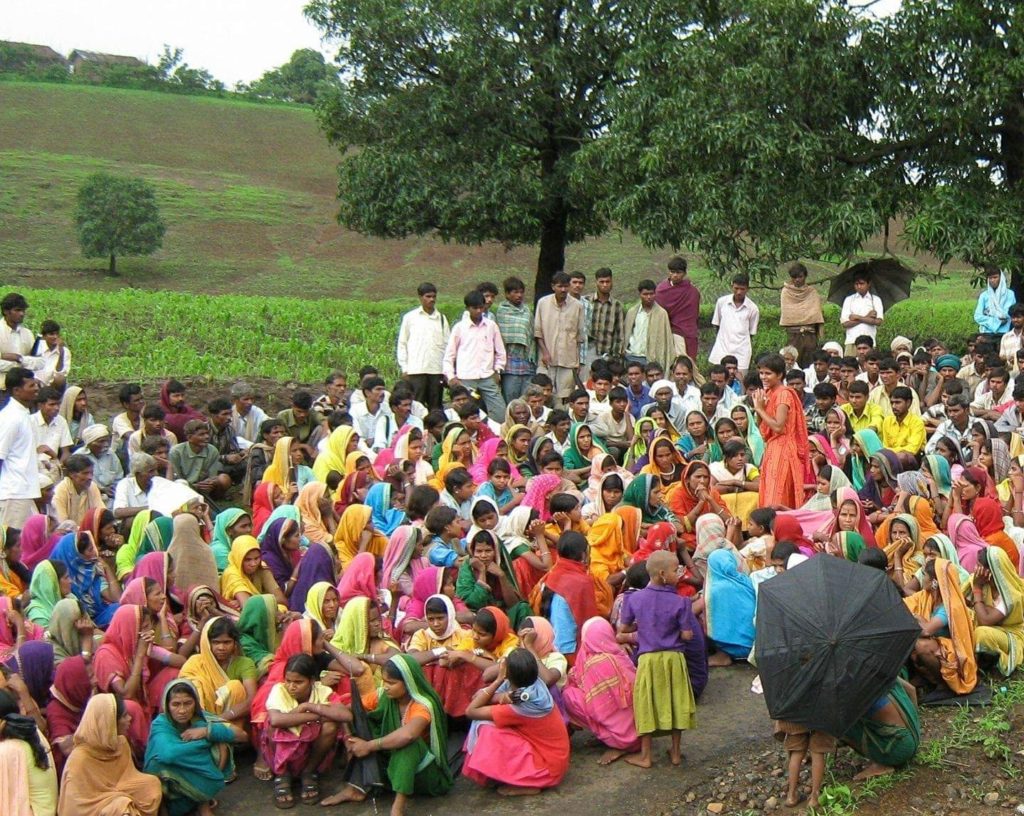
An organic gathering of community members to discuss forest rights in 2008. (Image from Nnnamaharashtra via Wikipedia)
The third parallel requires some set-up, starting with this list of trends testifying to a widening separation from nature:
- For a couple of centuries now we have been increasing our command of enormous amounts of energy. That energy, and the technologies that use it, have allowed unprecedented manipulation of nature, from mountaintop mining and trawling the depths of the oceans to altering the flow of rivers and changing the climate itself.
- The longstanding trend of migration to cities has resulted in more than half of humanity living in urban environments. Separated from the countryside, many people grow up having no idea where food comes from, and children often suffer “nature deficit disorder.”
- Tired of the real world? Get yourself a virtual reality headset and a game console and you can check out of it anytime and devote yourself to repelling invaders from Zorgon 9 or stemming the zombie apocalypse. Global sales of VR games, worth US$400 million in 2017, are projected to rise to US$2.4 billion in 2024.
- Frictionless consumerism, riding on the online-retailing juggernaut, has contributed to what psychoanalyst Sally Weintrobe calls a “culture of uncare”—the product of a “globalized deregulated economy” in which we are more anxious about our next Amazon order than the health of the planet.
- Artificial intelligence has advanced to the point that some observers believe that the arrival of convincing robot companions and lovers is only a decade or two away.
- It is now possible to order a CRISPR kit and start editing genes in your kitchen. Soon, perhaps, we will read about someone breeding glow-in-the-dark hamsters for sale to the neighborhood kids, just for fun. Or maybe it will be a lethal virus.
- The inexplicable (to me, anyway) enthusiasm for colonizing Mars seems to be on the rise. It poses, and is sold, as a grand adventure because humanity’s fate is to spread to the stars. That made sense to me when I was an avid teenage reader of triumphalist science fiction, but not so much today. In fact colonizing Mars is an enormously costly, risky, and misguided enterprise that seeks to make an unlivable planet livable, while we proceed headlong to make a perfectly livable planet (Earth) unlivable.
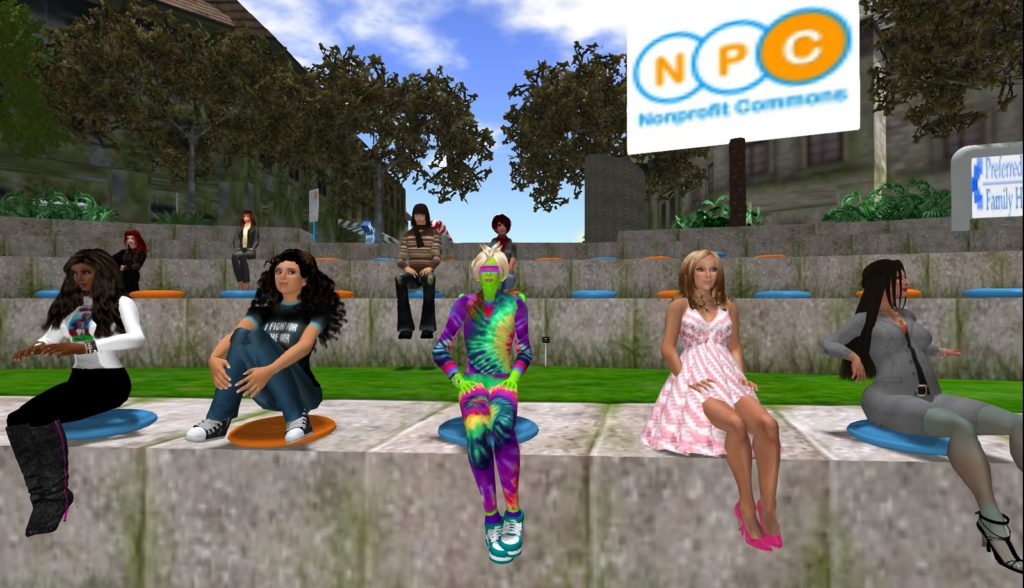
If DD happens in virtual reality does it still qualify as real? (Image from TechSoup via Flickr)
All of these reflect a detachment from, and even disdain for, the natural world. They sustain the illusion that we don’t really need the planet in anything like its natural state. Both Gaianism and DD are antidotes or counters to these—they work to reconnect us with ecological and social reality.
Gaians, of course, know what Gaianism is. But what do I mean by DD? Here’s the elevator speech description:
Deliberative democracy is a bottom-up method and political arrangement that routinely gathers ordinary people together and engages them in the governance of their own communities.
The escalator speech description takes a little longer. DD is a vision of governance that:
- is mainly locally focused (but can be, and is, scaled for use in larger polities);
- invites citizens into structured and modulated gatherings (in person and/or online) to support ongoing, respectful, and public dialogue, exchange, and mutual education;
- engages ordinary people and strives to be broadly inclusive of all community members;
- is based on solid, balanced information and transparent processes; and
- addresses “wicked” issues and aims to arrive at public judgments about them that are rooted in participants’ values and firmly and consistently linked to policy outcomes.
DD is a worldview, as well as a method and process for cultivating a robust form of citizenship. It rests on the notion that democracy is not a spectator sport, it’s something people do. DD starts with the assumption that ordinary people can gather to discuss an issue, not as adversaries seeking to win a debate (though they may well disagree, and not even like each other much), but as collaborators looking for solutions to shared problems. DD routinely taps expert knowledge, but experts are not in charge. Crucially, it also seeks to exert influence on bureaucrats, officials, and politicians, because a key aim of successful deliberative democracy is power, i.e., its ability to shape policy. These features help explain the appeal of deliberative democracy, which in its various expressions is used in thousands of places all around the world (see this report, for example).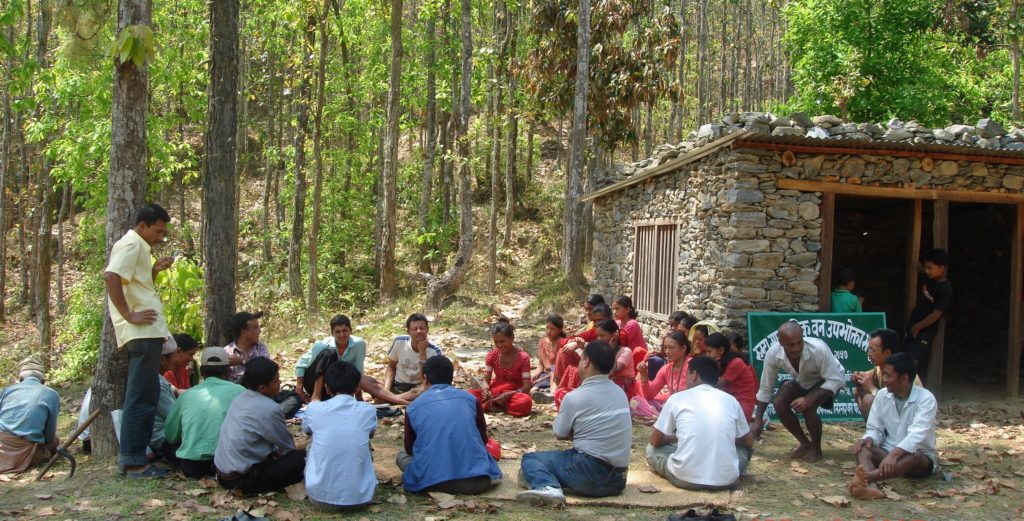
Community members gather to discuss “sustainable economic growth” and democratic governance. (Photo by Netra Sharma Sapkota, USAID/Nepal via Flickr)
What good is this body of knowledge and practice to Gaians?
First, Gaians care deeply about sustainability issues, and deliberative democracy is a powerful way to address them. Such issues, including climate change, are both universal and particular. Climate change, for instance, affects the entire planet, but expresses itself to people in, say, Miami as routine flooding in formerly dry places. In the U.S. West it’s the rising incidence of wildfires. Deliberative democracy as a governance practice is well suited to help address sustainability issues, because it:
- crowdsources public views and data collection,
- allows and encourages thoughtful consideration of problems,
- taps collective intelligence for solutions and/or coping methods, and
- creates political buy-in and support for action.
Second, much the same social processes—designed to build cohesion and social capital—are at work in both DD and Gaianism. So practicing these skills and methods in one forum would reinforce their use in the other. Especially as they grow, Gaian guilds might think about the benefits of organizing and running themselves along DD principles. (You’ve got to have a way to run meetings, and DD, while not easy, may be easier than mastering the 800+ pages of Robert’s Rules of Order.) Doing so would be useful in itself but would also help create a culture of deliberation that could take root in the wider community and be invoked in civic settings.
Finally, faith traditions offer their members the solace of community as a primary function, but many also pursue activism in one way or another. Do Gaians, and Gaian guilds, see themselves as strictly spiritual, social, and collegial gatherings (support groups?), or might some also adopt an activist role? If the latter, they could do worse than championing deliberative democracy by example, endorsement, and promulgation.


